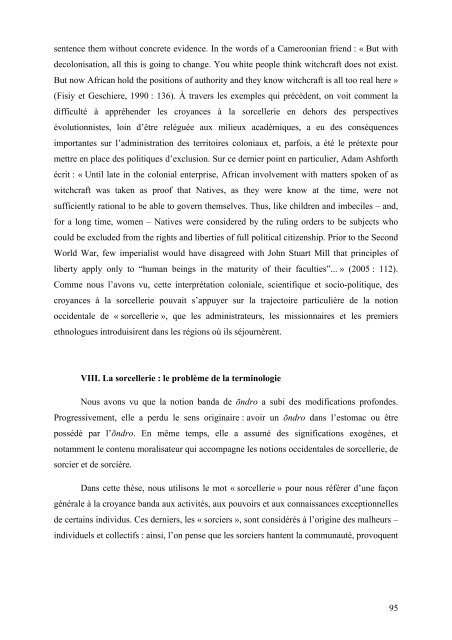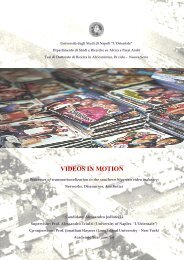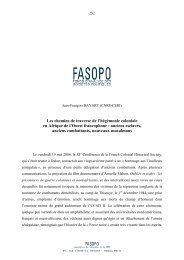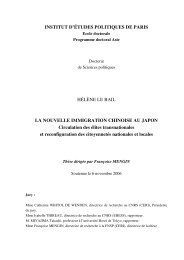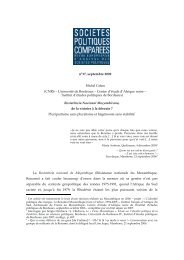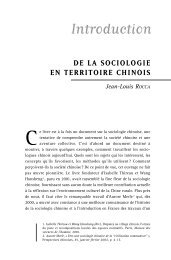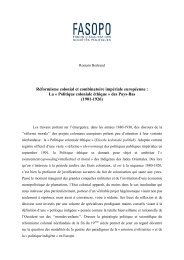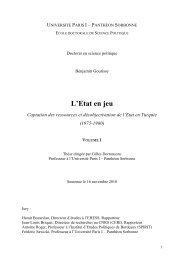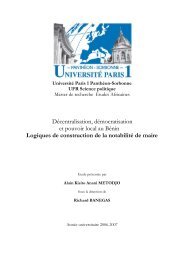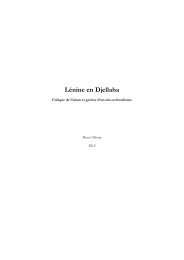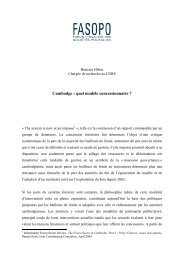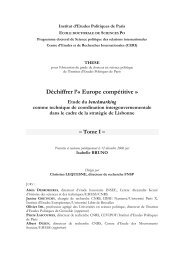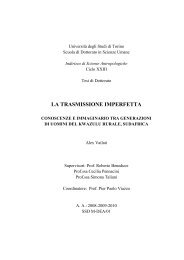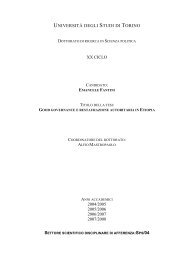- Page 1 and 2:
Université Aix-Marseille I / Unive
- Page 3 and 4:
le terrain africain. Notre étude a
- Page 5 and 6:
XIV. Situation économique et conte
- Page 7 and 8:
Chapitre IV - Du semalì à la sorc
- Page 9 and 10:
IX. La fin de la mission 387 X. Le
- Page 11 and 12:
des lacérations du passé 2 . Autr
- Page 13 and 14:
Nous proposons de considérer la d
- Page 15 and 16:
II. La rhétorique de la dépossess
- Page 17 and 18:
Todd Sanders résume dans une formu
- Page 19 and 20:
valeur pragmatique à la rhétoriqu
- Page 21 and 22:
des vagues d’accusations de sorce
- Page 23 and 24:
écits sur le prophète Ngoutidé a
- Page 25 and 26:
PREMIÈRE PARTIE LE TERRAIN : CROYA
- Page 27 and 28:
CHAPITRE PREMIER L’ensemble ethno
- Page 29 and 30:
Larue en France 17 . Les documents
- Page 31 and 32:
demeure la seule source d’informa
- Page 33 and 34:
3. L’aire dialectale banda, d’a
- Page 35 and 36:
Aujourd’hui, le souvenir de cette
- Page 37 and 38:
IV. De l’étymologie populaire au
- Page 39 and 40:
V. Rabah et al-Sanusi. « L’époq
- Page 41 and 42:
les bandes de Rabah eurent du mal
- Page 43 and 44: les populations razziées à un sch
- Page 45 and 46: 4. « Banda guettant le blanc pour
- Page 47 and 48: great man. In the 1950s among the B
- Page 49 and 50: la région de l’Ubangi à l’oue
- Page 51 and 52: produisaient dans les territoires f
- Page 53 and 54: fut publicisée comme un exploit mi
- Page 55 and 56: 5. Baran-Bakie et une de ses femmes
- Page 57 and 58: Si les documents sur l’implantati
- Page 59 and 60: tant des populations indigènes que
- Page 61 and 62: XI. André Gide, les danses banda
- Page 63 and 64: « affamés, malades, […] tombaie
- Page 65 and 66: En 1946, Boganda était effectiveme
- Page 67 and 68: XIII. L’après Indépendance À l
- Page 69 and 70: du pays : la capitale centrafricain
- Page 71 and 72: an, contre 12.000 tonnes de café e
- Page 73 and 74: et aux troupes de J.-P. Bemba qui
- Page 75 and 76: Sardan (1997 : 441) : en Centrafriq
- Page 77 and 78: I. Prémisse CHAPITRE II La sorcell
- Page 79 and 80: de sorcellerie. Auprès des prisonn
- Page 81 and 82: distinctions et des classifications
- Page 83 and 84: III. L’imaginaire de la sorceller
- Page 85 and 86: « dominants » sont assujettis au
- Page 87 and 88: l’indifférence (Ashforth, 1998a
- Page 89 and 90: chat, en banda, se dit nyau : or, c
- Page 91 and 92: comme le démontre un document dact
- Page 93: 8. « Sorcier indigène » Photogra
- Page 97 and 98: nous rejoignons l’opinion de Gesc
- Page 99 and 100: Azande : selon Mary Douglas ces rec
- Page 101 and 102: can be aligned along the same axis
- Page 103 and 104: Pritchard se configure comme une so
- Page 105 and 106: par un comportement socialement ma
- Page 107 and 108: une « chronologie » des accusatio
- Page 109 and 110: prolifération des rumeurs sur les
- Page 111 and 112: Nous reconnaissons dans le débat q
- Page 113 and 114: XIV. Sorcellerie, innovation Peter
- Page 115 and 116: Centrafricains, surtout les Banda n
- Page 117 and 118: seulement en reconnaître l’actua
- Page 119 and 120: autres : en l’occurrence celle de
- Page 121 and 122: participante » pour devenir provoc
- Page 123 and 124: aspect - une croyance « fonctionne
- Page 125 and 126: eference to a general breakdown of
- Page 127 and 128: aborder le sujet simultanément com
- Page 129 and 130: il convient de le préciser - n’e
- Page 131 and 132: précisément, dans la mesure où l
- Page 133 and 134: 10. Le Citoyen, 14 avril 2006 133
- Page 135 and 136: de mes « blindages »]. Bon, ce qu
- Page 137 and 138: Entre 1989 et 1991, le Général Fr
- Page 139 and 140: avant tout par l’écriture et la
- Page 141 and 142: Stoller, quant à lui, soulève les
- Page 143 and 144: implicite dans ce discours savant a
- Page 145 and 146:
l’anthropologie a joué, et conti
- Page 147 and 148:
- Page 149 and 150:
c’est à peu près aussi évident
- Page 151 and 152:
RCA et dans la région banda. Cepen
- Page 153 and 154:
Terence Ranger déjà cité plus ha
- Page 155 and 156:
lequel il analysait un culte « sor
- Page 157 and 158:
sélective, construite autour d’u
- Page 159 and 160:
I. Les descriptions coloniales du s
- Page 161 and 162:
Evans-Pritchard traita de l’assoc
- Page 163 and 164:
II. Le culte semalì de Ngakola Les
- Page 165 and 166:
semalì, le ndeka, entretient des r
- Page 167 and 168:
III. Le mythe : Ngakola, Tere et Yi
- Page 169 and 170:
souligné l’importance pour les p
- Page 171 and 172:
de Bigo, le « travail de l’imagi
- Page 173 and 174:
14. Représ
- Page 175 and 176:
la pharmacopée traditionnelle, qui
- Page 177 and 178:
début du siècle, sur le terme qui
- Page 179 and 180:
Ce qui est plus important, le yewo
- Page 181 and 182:
« Bon, rœ c’est le dieu princip
- Page 183 and 184:
l’origine de l’inégalité entr
- Page 185 and 186:
Le discours de notre interlocuteur
- Page 187 and 188:
ngàkolá est composé de ngà et k
- Page 189 and 190:
15. Trois statues b
- Page 191 and 192:
Ngbaka corroborent l’opinion d’
- Page 193 and 194:
16. « Costume de circoncis Dakpwa
- Page 195 and 196:
195
- Page 197 and 198:
XII. Le semalì selon le Père Jose
- Page 199 and 200:
plutôt que d’instituer les croya
- Page 201 and 202:
XIII. Le semalì selon l’abbé Ba
- Page 203 and 204:
Dans sa lutte acharnée contre les
- Page 205 and 206:
XIV. Le Père Tisserant : « la gra
- Page 207 and 208:
compilations de mythes (par exemple
- Page 209 and 210:
évidence, l’eyiewo jouait un rô
- Page 211 and 212:
la parole du haut d’une position
- Page 213 and 214:
avait observé sur le terrain étai
- Page 215 and 216:
administrateurs et les missionnaire
- Page 217 and 218:
d’organisation du territoire et d
- Page 219 and 220:
des difficultés à contrôler un t
- Page 221 and 222:
155). D’après nos recherches, da
- Page 223 and 224:
apprêté dans la forêt. Ici, avec
- Page 225 and 226:
Le témoignage de M. Nguipouganza s
- Page 227 and 228:
Déjà dans les années 70, W. Egge
- Page 229 and 230:
sango) dans la mesure où l’oracl
- Page 231 and 232:
26. Statuette conservée au Musée
- Page 233 and 234:
avec l’écorce de l’arbre dakpa
- Page 235 and 236:
sens que, à l’inverse du mani za
- Page 237 and 238:
cette œuvre herméneutique ont ét
- Page 239 and 240:
CHAPITRE IV Du semalì à la sorcel
- Page 241 and 242:
de l’analyse - on attribue aux in
- Page 243 and 244:
vomissant, manière de créer ainsi
- Page 245 and 246:
tu / es_mort / (accompli 360 ) / [T
- Page 247 and 248:
Hein ! / Enfants / pour moi / enfan
- Page 249 and 250:
médicaments et de l’association
- Page 251 and 252:
IV. Le semalì : l’initiation de
- Page 253 and 254:
ont inspiré Louise Eredeyo dans l
- Page 255 and 256:
V. Discours rhétoriques et stéré
- Page 257 and 258:
Ngakola 381 . Nos interlocuteurs ex
- Page 259 and 260:
30.
Costume de néo
- Page 261 and 262:
« Je ne faisais pas ça, j’étai
- Page 263 and 264:
peuvent expliquer qu’une partie d
- Page 265 and 266:
affamé a échappé des mains des m
- Page 267 and 268:
Les initiés à Ngakola auraient pu
- Page 269 and 270:
« l’histoire », T. Giles-Vernic
- Page 271 and 272:
topos de l’imaginaire banda, ils
- Page 273 and 274:
31. Le Citoyen, 15 décembre 2009 2
- Page 275 and 276:
« premiers indigènes du pays parl
- Page 277 and 278:
centrafricain. Ce dernier ne défin
- Page 279 and 280:
l’attribution de qualités « mys
- Page 281 and 282:
contradiction, cette divergence d
- Page 283 and 284:
Lorsque Dekoda se rend chez le clie
- Page 285 and 286:
physique - Dekoda a été torturé
- Page 287 and 288:
comme de la « galle ». Il voudrai
- Page 289 and 290:
- Page 291 and 292:
Banda proposent aussi une deuxième
- Page 293 and 294:
naturelle et enchaîne les événem
- Page 295 and 296:
34. Toile de l’artist
- Page 297 and 298:
Clémentine Yayomo, née en 1953 da
- Page 299 and 300:
diffusée en Afrique, dans laquelle
- Page 301 and 302:
Dans le miroir cassé et déformant
- Page 303 and 304:
VIII. Le fétichisme de l’écritu
- Page 305 and 306:
de Lévi-Strauss dans la célèbre
- Page 307 and 308:
l’« évolué », des forces de l
- Page 309 and 310:
La procédure d’enquête ouverte
- Page 311 and 312:
zarguina étant toujours très éle
- Page 313 and 314:
manderœ banda qu’on pourrait «
- Page 315 and 316:
Le récit qui précède ressemble b
- Page 317 and 318:
transformer en chat, en hibou, elle
- Page 319 and 320:
épistémologique sont particulièr
- Page 321 and 322:
CHAPITRE VI Guérison et lutte cont
- Page 323 and 324:
les nganga de la Ouaka tendent «
- Page 325 and 326:
« “les gens te regardent, elles
- Page 327 and 328:
37. Le nganga Rock au travail à Ba
- Page 329 and 330:
« pour parler des « me uru », da
- Page 331 and 332:
Le cas de Josiane a eu un large éc
- Page 333 and 334:
notes écrites, donc, n’est pas s
- Page 335 and 336:
V. La maladie et la guérison de Jo
- Page 337 and 338:
dit : “papa, il m’a attachée
- Page 339 and 340:
Cependant, certains abbés auraient
- Page 341 and 342:
Un affrontement entre Josiane et se
- Page 343 and 344:
« dominants » et les « dominés
- Page 345 and 346:
jeune fille n’avait jamais plus r
- Page 347 and 348:
débrousser un champ. En 2008, un v
- Page 349 and 350:
associations fermées que dans des
- Page 351 and 352:
En reprenant un argument que le nga
- Page 353 and 354:
(Geschiere, 2006 : 106). Parmi les
- Page 355 and 356:
jeune fille avait alors vu Michel M
- Page 357 and 358:
un ayo/pharmakon, sa violence provo
- Page 359 and 360:
l’innovation (...) ainsi appréhe
- Page 361 and 362:
volants comme des avions, de métam
- Page 363 and 364:
QUATRIÈME PARTIE L’ÉVÉNEMENT N
- Page 365 and 366:
CHAPITRE VII La vie de Ngoutidé :
- Page 367 and 368:
Au village Lioua, où le prophète
- Page 369 and 370:
mêmes années, il se maria une pre
- Page 371 and 372:
Marie de la Ouaka à Bakala signale
- Page 373 and 374:
41. La première allusion à la mis
- Page 375 and 376:
Les « fétiches que les gens cache
- Page 377 and 378:
s’exprime dans la répétition de
- Page 379 and 380:
les fétiches avec mépris et les j
- Page 381 and 382:
foule rassemblée à Grimari, il y
- Page 383 and 384:
42. et 43. La fiche n° 67-29 c
- Page 385 and 386:
interprétée comme le signe d’un
- Page 387 and 388:
décennies dans la région. D’apr
- Page 389 and 390:
Le conte « N’Goutédé, l’illu
- Page 391 and 392:
nom de Marguerite. Cette dernière,
- Page 393 and 394:
CHAPITRE VIII Le scandale de la con
- Page 395 and 396:
années 60, et de celles judéo-chr
- Page 397 and 398:
d’emprunt qui les place en situat
- Page 399 and 400:
une littérature scientifique peu n
- Page 401 and 402:
suivre une autre stratégie : il de
- Page 403 and 404:
connaissance des rapports militaire
- Page 405 and 406:
parce que les hommes politiques ont
- Page 407 and 408:
eaucoup de fétiches et il les dét
- Page 409 and 410:
46. « ...le peuple de la brous
- Page 411 and 412:
Nous savons que durant les trente a
- Page 413 and 414:
Bambari, au cours d’une « prése
- Page 415 and 416:
« personnage prophétique » qui p
- Page 417 and 418:
autrement dit, sur l’inéluctabil
- Page 419 and 420:
qui rompent l’illusion d’une «
- Page 421 and 422:
Toutes les choses que les Banda ont
- Page 423 and 424:
CONCLUSION
- Page 425 and 426:
pendant des mois, avec patience, ju
- Page 427 and 428:
Nous avons vu plus haut que dans le
- Page 429 and 430:
À ce point du fieldwork - et de no
- Page 431 and 432:
d’« agir » à l’intérieur d
- Page 433 and 434:
(...) « Que celui qui a nuit à mo
- Page 435 and 436:
48. Village banda de la Ouaka juin
- Page 437 and 438:
AUGÉ, M. et COLLEYN, J.-P. (1990),
- Page 439 and 440:
BOULVERT, Y. (1984), « À l’occa
- Page 441 and 442:
DE BANVILLE, G. (1991) Bibliographi
- Page 443 and 444:
FERGUSON, J. G. (2008), « Global D
- Page 445 and 446:
HENRY, C. (1998), « Le discours de
- Page 447 and 448:
MARY, A. (1993), « Le travail symb
- Page 449 and 450:
PÉNEL, J.-D. (1997), « Boganda et
- Page 451 and 452:
TAUSSIG, M. (1984a), « Culture of
- Page 453 and 454:
1 et 2 TABLE DES FIGURES La Républ
- Page 455 and 456:
Cette photographie, représentant u
- Page 457 and 458:
35 Le fétiche scriptural découver
- Page 459:
459


